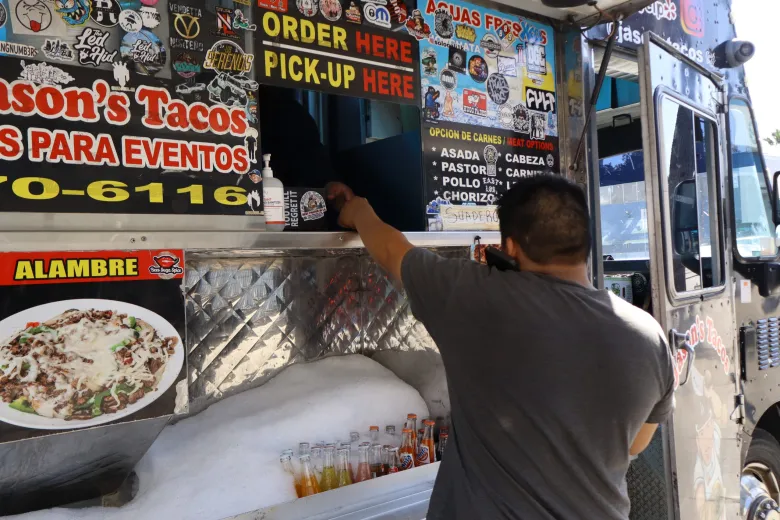This article was originally published by Boyle Heights Beat, a nonprofit newsroom serving Boyle Heights and the eastside.
Across Boyle Heights and East L.A., where immigrant communities form the backbone of the local economy, fear sparked by recent ICE raids has reshaped daily business.
Street vendors have eliminated seating areas. Storefronts display signs warning off immigration authorities: “Private property” or “ICE is not welcome here.” Some shops now unlock their doors only to known customers, at times with children acting as gatekeepers.
These urgent precautions, business owners say, are necessary to protect staff and customers.
At Jason’s Tacos in East L.A., owner Jason Devora was forced to overhaul his business after federal agents raided his taco truck on June 12. One employee and several customers were taken, he said, leaving grills unattended and his truck deserted.
“We’re now doing phone orders just to have everything ready. We’re doing everything to-go and we have our trompo up there,” Devora said, pointing to his food truck behind him.
Devora’s new model – pre-orders and no lingering – aims to reduce the time his customers spend outside his truck waiting for food and vulnerable to a potential ICE raid. He brought in his brother to replace his detained employee and is working to launch a delivery service.
Devora’s story is not unique. Recent ICE raids around Southern California have prompted businesses to scale down hours, retool operations or temporarily shut down – drawing comparisons to the early days of the COVID-19 pandemic. In some cases, children of taqueros are stepping in to manage their parents’ businesses.

Graciela Ruiz, owner of La Mexicana Bakery in East L.A., took proactive steps to discourage agents from entering.
“I don’t want [to give] access to my business, and I don’t want [ICE] coming here to bother anyone here – either the customers or the employees,” Ruiz said, pointing to a row of anti-ICE signs against her panaderia’s window. “That’s the reason I put them.”
She admits business has slowed at her panaderia – noticeably but not drastically.
Next door, at Mexican restaurant La Que Si Llena, several employees said business had fallen off. The eatery began to offer local delivery to make up for the lack of business. On a recent weekday, they closed at 2:30 p.m., five hours earlier than usual.
In Boyle Heights, Leo Guerrero and his wife have also seen a shift at their discount clothing and furniture store.
“Usually, I don’t like to pick up the phone. But now I’m picking up,” Guerrero said with desperation in his voice. “I’d rather have [customers] come here and look around, but now they’re calling, getting one thing and then, boom, they’re out the door.”
Guerrero suspects that some of his regular customers have sent their children to do the shopping for them, likely out of fear of exposure due to their immigration status. He considered staying open later to give customers more chances to shop. But with fewer sales and rising fear, it may not be enough.
In response to growing concerns, community leaders and organizations are stepping up to support local business owners.
Just last week, Centro CSO and Organized Power in Numbers held canvassing events along Cesar Chavez Avenue and First Street to educate workers about their rights.
The Boyle Heights Chamber of Commerce, in partnership with City Councilmember Ysabel Jurado, has scheduled a business readiness workshop for June 30. The in-person session aims to equip business owners with tools, training and resources to protect their workplaces and employees in the event ICE agents arrive at their property.
Meanwhile, L.A. County Supervisor Hilda Solis introduced a motion directing the Department of Economic Opportunity to study the raids’ economic impact on small businesses. The report will also explore ways to support them “in a manner that is responsive to their language and immigration needs.”
But for some businesses, no level of adaptation can offset the chilling effect of the raids.
Along 6th Street, a manager of a taqueria argued that the economic impact of the ICE raids has already hurt his business more than the pandemic. The owner, who chose to identify himself only as Mario out of fear for his safety, says he now closes an hour early after losing half of his regular business.
“We’re all afraid of the raids,” he said. “And now, a lot of these other businesses around me just don’t show up.”
Editor’s Note: This story has been updated to add details about a community canvassing event held last week.







